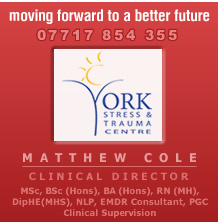Depression is the most common mental health problem throughout the world. More than half of us will at some time experience symptoms of depression severe enough to affect our lives. Doctors see the problem on a regular basis and can recommend how and where to get treatment. At least one patient with depression is likely to present at each general practitioner's surgery session. The cost of depression to the NHS is huge. Moreover, depression can be life threatening. Of the 5000 people who commit suicide every year in the UK most will have been depressed.
What is Depression?
Depression may present in various forms, and symptoms like those listed below - not everyone gets all of these symptoms though!
Mood changes usually occur in depression. People often feel sad or numb for most of the time. Anxiety and increased irritability are often present.
Thinking changes can also be seen, such as difficulties concentrating, making decisions or remembering things. Typically, depressed people think in a pessimistic way, seeing themselves as unattractive, inadequate or even as bad, finding their environment unfulfilling and their future bleak. They often have unhelpful styles of thinking such as imagining all of the very worst things that could happen and overly blaming themselves. Thoughts that life is not worth living can occur which normally go away once the depression improves.
Physical changes are common in depression. Sleep can become impaired, such as waking-up in the early hours and being unable to fall back off to sleep. Appetite and weight loss is common although they can both also go up. The persons sex-drive and ability to enjoy their usual interests and activities are also commonly reduced. Patients often complain of aches and pains or of feeling anxious or wound-up. Some experience excessive tiredness and of slowed-up thinking and movement.
Behaviour changes also normally occur to some extent. Because of the features of loss of the ability to enjoy, anxiety symptoms, and difficulties concentrating, sufferers often become inactive and unwilling to try out the activities that they used to do. They may therefore avoid work and social activities.
Depression can vary from mild features to a very severe illness where the sufferer's ability to continue with their normal life comes to a standstill. Depression can also alternate with "high" episodes as part of a manic-depression or bipolar illness which is much less common than depression by itself, affecting only 1% of the population.
Causes
There is no one single cause of depression. Several factors can act together to cause it. Depression does appear to run in some families and therefore some people are vulnerable to depression throughout their lives because of this. Others are vulnerable because of the surroundings in which they live. For example those who have difficulties with raising young children or those who are isolated and don't get support from others, are much more at risk of developing depression. Vulnerability to depression also comes from having suffered from disruptive childhood experiences such as abuse, bullying or loss. In addition depression often comes about as a clear reaction to a major event in their lives, such as a relationship break-up, loss of a job, or the loss of a loved one.
Different Treatments For Depression
Most treatments for depression involve either talking with a counsellor or therapist (psychological treatments) or taking anti-depressant medication from a doctor. The combination of tablets and psychological treatment appear to have the best results for those suffering from severe depression, but may not be needed for milder cases. The benefit of medication is that you don't need to sit and talk with a therapist for a number of hours but the main disadvantage is that, depending on the medication used, they can have a number of side-effects. Because of the suffering that depression causes, the risk of suicide, and the fact that untreated depression is more likely to return again in the future, it is undoubtedly better to get treatment. There are a number of different types of medication and psychological treatments. So it is important for you and those you trust to help you to decide, such as friends, family and professionals to choose the best option for you. Some treatments have got more evidence to support them than others - anti-depressant medication and cognitive-behavioural therapy are two forms of treatment which have been shown many times to be effective in the treatment of depression. Both these approaches can provide relief from depression within 3 to 4 weeks and long lasting relief within 3-6 months.
CBT for Depression
Cognitive or cognitive-behavioural therapy has been shown to be at least as effective as anti-depressant medication, but to be better than medication in the prevention of relapse and recurrence of illness. Some of the common aims in CBT for depression are: -
- To re-establishing previous activity levels. In depression people stop doing many activities that used to give a sense of pleasure and meaning. CBT aims to slowly restart these as a way of bringing pleasure back in to the sufferer's life. Exercise in particular has been shown as an effective treatment for depression in its own right.
- Where sufferers have stopped meeting with friends or avoid social contacts, CBT will also aim to slowly build this up again. Socialising can be very difficult for those with depression because of difficulties concentrating on what is being said and the symptoms of anxiety that often go hand-in-hand with depression.
- The sufferer learns to fight the negative styles of thinking which in so many cases makes their mood even lower. Techniques that fight some of these unhelpful thinking styles will be tried out.
- Learning to spot the early warning symptoms of depression is important if another episode in the future is to be prevented.
Information about depression is also available from: -
The Depression Alliance,
35 Westminster Bridge Road,
London
SE1 7JB
Tel 0207 6330557
Fax 0207 6330559
E-mail: www.depressionalliance.org







